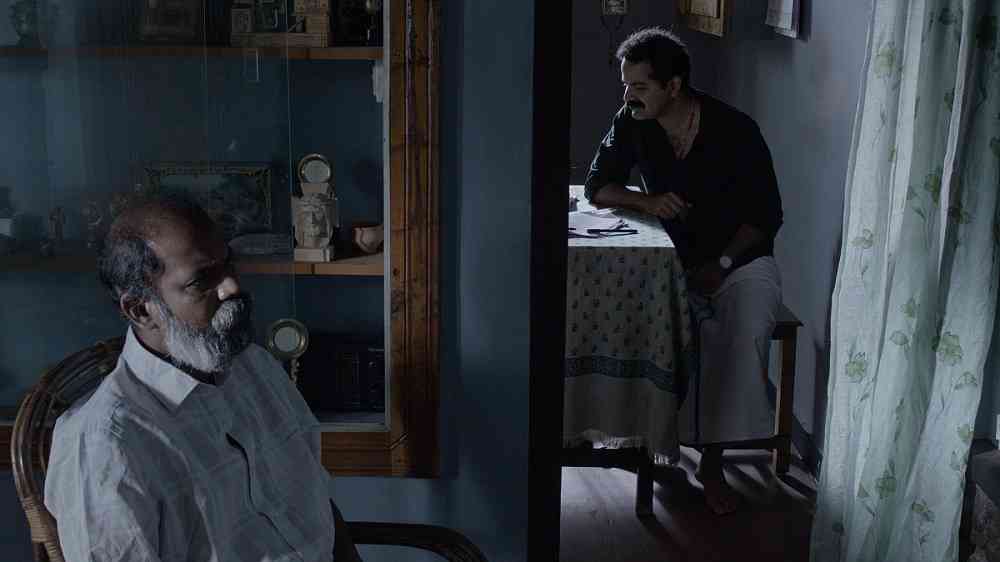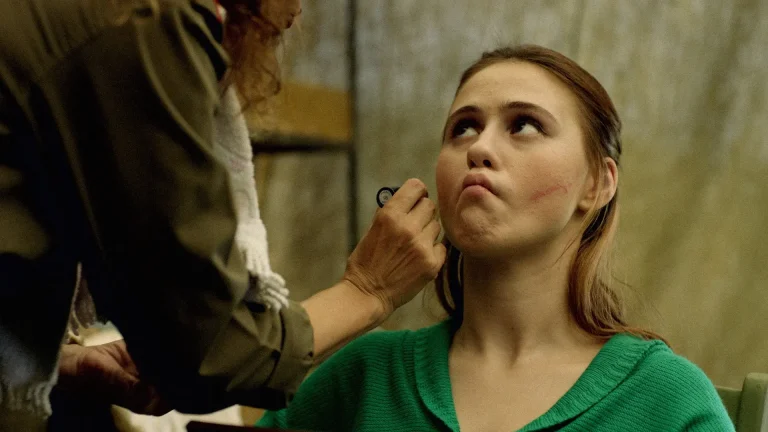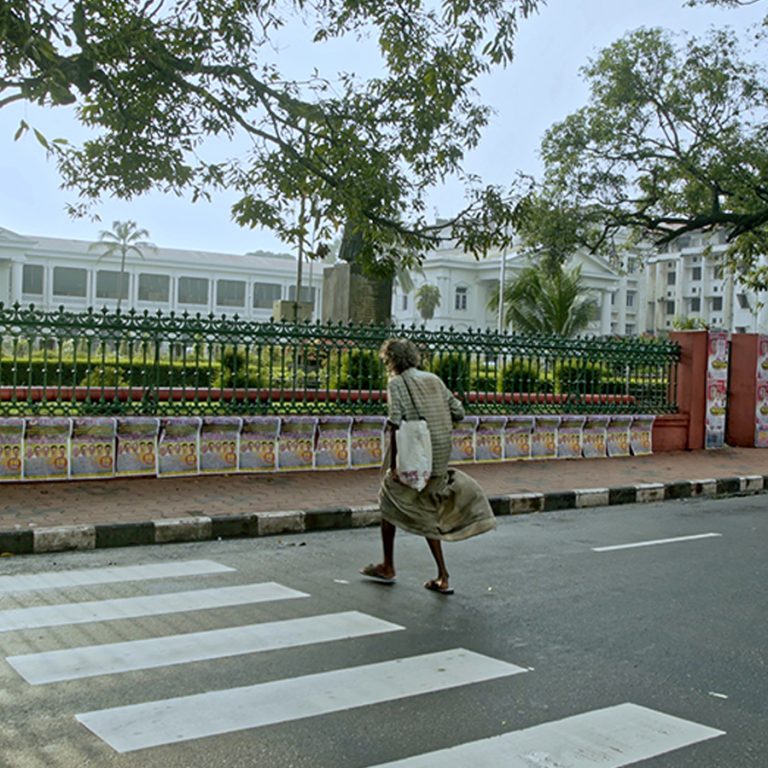Family (2023) Review: Don Palathara’s new film, Family, has a lurking quality to it. Concrete information is skirted as the filmmaker opts for storytelling premised upon implication and gives free rein to the viewers to make their own set of inferences. As the film moves between social configurations and an individual’s place in them vis a vis the presence of an overarching religious authority, it adopts a tone remarkably attuned to the everyday rhythms of living, gathering, and hanging out.
This style is not alien to anyone who has watched Palathara’s earlier films, especially Vith and 1956 Central Travancore. Still, the fluidity with which he shifts between various settings and interactions, clenching its mundanity tightly, signals greater confidence in his storytelling. This is evident in the ways he interposes both the larger and intimate dynamics within a paternalistic framework of institution and community.
Like in Palathara’s earlier films, the aegis of the Church plays a vital role; its agents, in the form of nuns, critically decide the functioning of the tight-knit community in Palathara’s native village in Idukki. While the film deploys suggestions to depict the center of the rot, its treatment reflects a clear, direct politics of conformity and disobedience enforced by the custodians of religion who levy their punishments to greater damage.
There is little room spared for the individual within the intricate web of the society and community; the villagers’ lives and gossip are so deeply interlinked that they enact a form of mercilessness in their elaborate surveillance. A girl who attempts to elope returns home after her lover betrays her. The weight of social censure is so immense it shatters the girl’s father.
All of these play out in Palathara’s characteristic unfussy tenor. Unraveling often in a series of long takes, with a determined eschewal of sound in several scenes, Family privileges a still, sustained engagement with the barest elements within a frame, prodding us to carefully scrutinize. A boy, Subin, is dropped home by Sony, the emblematic good neighbor of the tale, after a movie trip. The boy goes into the bathroom and seems to be examining himself for some marks or bruises. As the film progresses, we come to notice Subin’s intimate attachment to Sony. He waits fervently for Sony’s company. When Subin chides him over something, Subin’s face is crushed with palpable heartbreak.
The film begins with the talk of a leopard on the prowl. The creature becomes a sort of central figure, dominating village hearsay. It is spotted sparingly. When someone shares a story of its sighting, he stresses that it looks even more formidable than what the rumors make of it. The parallel setup between the leopard and the real beast skulking amongst the villagers is not an inspired one, but the mechanisms of power are fascinating to watch unfold.
Sony, who once ran a tuition center, is a village figure who does odd jobs for his community and is seen as someone full of generosity and kindness, ever ready and eager to offer a helping hand or an empathetic ear. He hears a woman’s rants about her family while he helps her in the kitchen, peeling beans and dispensing practical advice to her.
He fixes people’s crises and advocates solutions to build connecting roads to isolated houses in the village. When he is approached for tutoring, he tells the parent to set the fee amount. He slips in and out of people’s homes with ease, slithering into circles of trust on the sheer force of the goodwill he has among his community. He willingly proposes to help out with settling funeral bills.
The villagers call on him to give poetry recitation lessons to their kids, have him ferret out jackfruits from their trees, and find him an immediate aid in crises, including hauling a strayed cow from a ditch. He has his rapport most with the kids and youths of the villages. Sony cheerfully fulfills the recreational needs of the village kids as well as provides them with career counsel. He offers them driving lessons and takes them to the movies.

He has perfected the art of grooming. But he also faces rebuff from adolescents who seek to break out of his toxicity, denying him any further intimacy than in everyone’s view. Yet, in Palathara’s telling, suppression extends into the public sphere, those in the know goading into operation a string of events that will further shelter the ‘antagonist’ of the tale. His touted rehabilitation will be yet another conduit for him, a literal playground for exploitation, teeming with probable future victims, which is how the film finally chooses to make its protagonist/antagonist come up in full view.
There’s such simplicity and a disarming guilelessness with which Vinay Forrt portrays Sony he almost seems to exemplify an archetype, albeit a rare one, of a kind, thoughtful man. He projects an embodiment of pure, sincere harmlessness, a person with noble, shining intentions. It is too good to be true. Palathara keeps constructing this epitome of goodwill while patiently carrying a rotten underside with delicious ambiguity.
The mask of geniality comes off through what we fear. The tale unwraps itself with a keen sense of deliberation. A man watches TV, while in the next room, Sony is teaching the man’s daughter. We observe from a distance as Sony gets up and moves over to the girl’s side, disappearing from view.
The scene lingers, Palathara not cutting away, forcing us to sit with a slowly developing knot of prickly fears within us. Our apprehensions are not confirmed, but we can sense their truth being bolstered gradually. In a later scene, the girl, visibly anxious, hides her presence in an empty home when Sony tries to check.
As soon as there is some detection of his misdemeanors, the narrative is spiked with a shot of urgent quickness, events and situations speeding up as a massive cover-up is initiated and put in place. Rani, who is the one to first air her suspicions regarding Sony, pointing to his over-friendly gestures with children, has her insinuations initially dismissed as baseless anxieties borne from her pregnant state, which, as another woman reasons, is making her feel overprotective about kids.
When word spreads to the higher-ups, Rani is castigated by no less than a nun. She is reminded a family is not just constituted by parents and their children but involves a host of other entities. When a woman makes allegations without the force of conviction and clarity, she has to face dire consequences, the nun reprimands Rani, not letting her speak and substantiate her claims any further. There is an implied admission that the Church has seen horrors aplenty but also a shunting of guilt, an absolute nonengagement with misdeeds, a mere piggybacking of them onto divine mercy.
Ironically, God’s sacred will that is supposed to escape none, as another lyric we hear in the background asserts, manifests itself in the protection and enabling of a predator, only expanding his arena of abuse. The way the misdeeds are hushed up is symptomatic and tells of much larger malaises within the community, foregrounding an entrenched lack of reckoning. The purging of his sins, which God watches over as both a hymn and the nun reiterate, is repurposed into filling a lack in an institution under Catholic auspices.
While Family coasts along with a great sureness in itself, it flags in the discernible rush of the final stretch. The telling becomes brisker to a fault, especially concerning Sony’s developing relationship that the priests and nuns ensure has to be rooted out. It feels contrived, cursorily, and hastily executed.
The staidness also veers into some tedium, the narrative meandering into predictable terrain. However, Palathara gets us right back on track, injecting a chill into our bones with a powerful ending brimming with inevitable dread. A monster is allotted a new hunting ground, Palathara leaving us with stark possibilities staring back at us.







![Abyakto [2019] ‘LIFF’ Review: About Unexpressed Nuances of Life](https://79468c92.delivery.rocketcdn.me/wp-content/uploads/2019/06/Abyakto-LIFF-Review-Featured-768x512.jpg)
